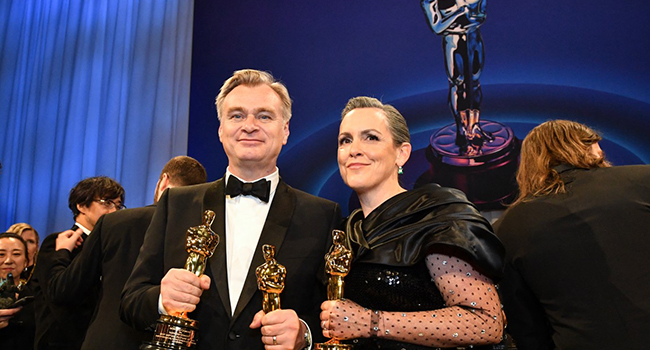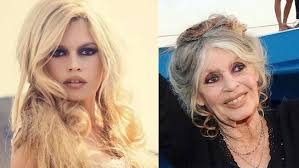
From ‘Batman’ To Best Director, Nolan Stamps Unique Mark On Hollywood
Christopher Nolan, the undeniable Hollywood hitmaker whose daring and ambitious blockbusters appeal to both mainstream and cult audiences, at last established his artistic dominance with the Oscar-winning "Oppenheimer."
The British-American director, a tea-drinking, meticulous perfectionist who is notorious for fusing clever playfulness with a focus on reality, won best director at the Sunday Academy Awards.
At the Dolby Theatre, Nolan informed the crowd, "Movies are just a little bit over 100 years old."
"We have no idea where this amazing journey will end. But it means the world to me to know that you believe I contribute something worthwhile.
It is the pinnacle of his career thus far, transforming Nolan from arthouse darling ("Memento") to superhero savior (the “Dark Knight” films) to rare purveyor of original sci-fi (“Inception,” “Interstellar”) in a market dominated by sequels.
The stunning 2017 war epic "Dunkirk" was the closest Nolan, 53, has ever been to winning an Oscar.
However, prior to "Oppenheimer," which dominated Sunday's gala and took home seven statuettes overall, the director—who is occasionally written off by critics as a skilled technician and genre-bound filmmaker rather than a true visionary auteur—had never won an Oscar.
Nolan was raised in a very transatlantic environment. He was born in 1970, the son of an American air hostess and a British advertising copywriter.
Nolan started using his father's old Super 8 camera to make films very soon after he saw "Star Wars" and "2001: A Space Odyssey" in theatres when he was seven years old.
Prior to pursuing his studies in English literature at University College London, where he was accepted in part for its filmmaking facitilities.
After graduating, he followed Emma Thomas to Los Angeles, where he met and co-run a movie society with the woman who would become his future wife and producer.
At thirty, Nolan became well-known for "Memento." A festival hit and the director's first Oscar nomination for screenplay, it was a fiercely intelligent and twisty avant-garde noir with the non-linear narrative that has become his hallmark.
"Proud"
(From L) On March 10, 2024, US actor Mark Ruffalo and Sunrise Coigney attend the 96th Annual Academy Awards at the Dolby Theatre in Hollywood, California. (Image courtesy of DAVID SWANSON/AFP)
In 2002, Nolan made his big-budget directing debut with "Insomnia," starring Al Pacino as a Los Angeles police officer assigned to look into a murder in Alaska.
Nolan was recommended by seasoned director Steven Soderbergh Veteran filmmaker Steven Soderbergh told Warner Bros. about Nolan and later related a chat he had with Pacino on the set.
Pacino told Soderbergh, "I can tell you right now, at some point in the very near future, I'm going to be very proud to say I was in 'a Christopher Nolan movie.'"
Nolan was able to present Warner with his realistic and gritty idea for the upcoming Batman films the studio was developing thanks to the film's success.
The ensuing "Batman Begins" marked the beginning of a trilogy of films directed by Christopher Nolan, featuring Christian Bale as the costumed hero.
The second installment, "The Dark Knight," is frequently regarded as the best superhero movie ever produced. Undoubtedly, it was the inaugural film to achieve a $1 billion gross and the first to secure Heath Ledger's posthumous acting Oscar.
With a career total of more than $6 billion in box office receipts, Christopher Nolan's third film, "The Dark Knight Rises," is still his greatest commercial success despite receiving less critical praise.
Among those films were Hugh Jackman and Bale's historical thriller "The Prestige," which tells the story of two rival stage magicians. Nolan also released "Inception" during that time.
nuclear
The Oscar for Best Picture is displayed in the press room by British film producer Emma Thomas, American film producer Charles Roven, and British filmmaker Christopher Nolan (who is also the Best Director) pose in the press room with the Oscar for Best Picture for “Oppenheimer” during the 96th Annual Academy Awards at the Dolby Theatre in Hollywood, California on March 10, 2024. (Photo by Robyn BECK / AFP).
"Inception," a highly ambitious heist film starring Leonardo DiCaprio and Marion Cotillard that seamlessly transitions between multiple dream worlds, solidified Nolan's standing as a singular Hollywood director capable of securing large budgets and complete creative autonomy for his own productions while maintaining a profitable margin.
It brought Nolan his first solo Academy Award nominations since "Memento" and won four Oscars, including one for its breathtaking visual effects.
"Interstellar," his follow-up original science fiction film, won another Oscar for visual effects and marked the beginning of Nolan's continuing partnership with renowned theoretical physicist Kip Thorne.
With "Dunkirk," a suspenseful account of the famous World War II evacuation of hundreds of thousands of Allied soldiers from a beach in northern France, Nolan then turned his focus to the past.
Its 1940s period setting foreshadowed "Oppenheimer," and it earned Nolan his first nomination for best director.
Similar to this, Nolan's concern over nuclear apocalypse was first expressed in his next film, "Tenet," another ambitious, original science fiction film.
But it was reading "American Prometheus," the Pulitzer Prize–winning biography of atomic bomb pioneer J. Robert Oppenheimer, published in 2005, that set Nolan on the route to the movie that would ultimately win him an Oscar.
For the Best Director statuette, he defeated Yorgos Lanthimos ("Poor Things"), Justine Triet ("Anatomy of a Fall"), Jonathan Glazer ("The Zone of Interest"), and Martin Scorsese ("Killers of the Flower Moon").





